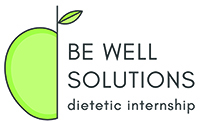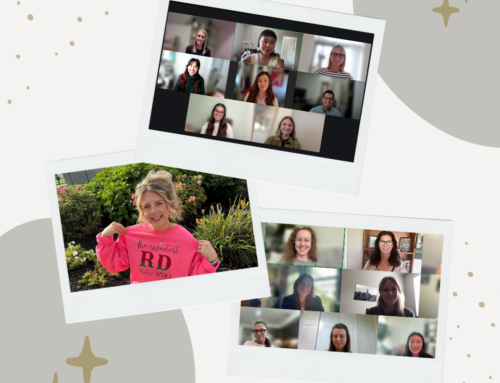Q&A with Tristyn Patrick, BWS DI associate director and faculty advisor
Many non-traditional students choose a distance dietetic internship rather than a traditional one. They are established in their communities, may have families there, and aren’t able to relocate for long periods of time. They are also eager to get an insider’s view into potential workplaces in their hometowns. Each BWS DI cohort includes at least one intern entering the field as a second career, and several of our faculty have also taken this path. We asked Tristyn about her journey to becoming a registered dietitian in the hope that it would provide some insight for aspiring second-career RD2Be’s.

1. What were you doing before you decided to become a registered dietitian, and why did you make the switch?
I had had a long career in business, including stints in banking, consulting, high tech, and most recently academic publishing. I was beginning to feel burnt out; meanwhile, my interest in nutrition was growing. That started when I went on a wellness retreat and started learning about the role of food in disease prevention. Later, I participated in a weight loss program at my gym and saw firsthand just how problematic some of those programs can be. We relocated for my husband’s job, I had to leave my position, and I took the opportunity to go back to school for my MS in public health nutrition.
2. What was it like going back to school as a mature student?
Luckily, I had always enjoyed school. And this time around I appreciated the classes even more than I had during my undergrad and MBA. I was there because I deliberately chose to be, rather than following an expected path. And I was finally immersed in content that deeply interested me.
One challenge was adjusting to the lack of daily feedback and sense of accomplishment. At work, you see the results of your efforts pretty quickly, but at school, all you get is a grade at the end of the semester. I was also in a different place than my fellow students. I needed to adhere to a structured schedule because of my family commitments, whereas they had extracurriculars, social lives, and the stamina to stay up late at night to get assignments done. On the other hand, I really valued the flexibility that an academic schedule offers. I was able to be home with my kids most afternoons, even if we were just doing homework together. And being in school was much less stressful than working. I had the perspective of knowing that if I did poorly on an exam it only affected me, not my customers or colleagues.
3. Did you choose a distance dietetic internship?
No, but I wish I had known about the distance dietetic internship option. My MS was a coordinated program, so my rotations were pre-determined. It was a fantastic experience, but some of my sites were not very closely aligned with my interests. In addition, at the time students were required to complete the longest and most important rotation out of state. That was expensive and disruptive. And I could not pursue a permanent job at the site, so I was not able to capitalize on the relationships I formed there.
4. Was it difficult to enter rotations as an intern after having held higher-level positions in your past life?
It was critical to go into rotations with the right attitude. I was there to learn. I might have been competent in my own field, but not in nutrition and dietetics. There, my preceptors were the experts, and I respected that. I did a lot of entry-level work, but it was new to me, so it was plenty challenging. As soon as the work started becoming routine, I was on to the next rotation. The most awkward part was not looking like what people expect from an intern. That awkwardness evaporated quickly, though. Everyone at my sites was incredibly welcoming and accepting.
5. What were some of the advantages of having had experience in a different field?
There were a few. I was used to going into new environments and working with new people all the time, so I found starting new rotations to be less intimidating than others might. Having an understanding of business made me aware of the operational context in which the registered dietitians operated, and that made getting to know the sites even more interesting. Finally, preceptors really appreciated my maturity and professionalism. They were willing to give me lots of responsibility early on.
6. You must have been out of practice at taking exams. Was it hard to study for and pass the RD Exam?
Taking exams is never fun, especially a test as demanding and important as the RD Exam. Going back to school got me back into studying mode, so that helped. I took some time after my dietetic internship to focus on studying, and I treated it like a full-time job, establishing a consistent schedule just as I had during my MS program. I also took advantage of downtime throughout the day – mostly waiting for my kids in various places – to do practice questions and review flash cards. I reminded myself that I had successfully cleared several of the hurdles in my career transition. The exam was just one more.
7. Did being a second-career registered dietitian make it easier to find your first job?
Definitely. This is where the “not my first rodeo” came in. I already understood how finding a job is rarely about responding to a posting and about how important networking was. I put that knowledge to work even while in my dietetic internship and had options as soon as I passed my exam.
8. Is there anything that surprised you about becoming a registered dietitian?
When I entered my MS program, I thought that registered dietitians sat in cozy private practice offices counseling clients all day long. That is what I had planned. I may have had a vague notion that registered dietitians worked in hospitals too, but I was not quite sure what they did. Obviously, I had a lot to learn. I continue to be amazed by the incredibly varied roles that registered dietitians take on in healthcare, public health, industry, education, and beyond. Almost all of the registered dietitians I meet have pursued winding roads to where they are, and for many, those roads will continue to twist and turn. Our profession is never boring!
9. You have been in the dietetics field for a while now. Do you still find yourself relying on your prior work experience?
Every day. It is probably more relevant now than it was during my internship because it has allowed me to advance quickly and take on responsibilities beyond the traditional registered dietitian role. Corporate wellness was a great fit for me. I loved working in healthcare facilities, but the minute I walked into Be Well Solutions I felt right at home. Running a growing dietetic internship involves a lot of strategy and operations, and I am able to contribute on those fronts. Plus, the problem-solving skills you learn in a business career are directly transferable to any other field.
10. What advice would you offer to people considering a second career in nutrition and dietetics?
Nutrition and dietetics has been a great new chapter for me, and it can be for you too. It’s hard to walk away from a comfortable job where you feel competent and confident, but you never truly leave your skills and experience behind. I definitely recommend talking to as many registered dietitians as you can before making the leap. It will help you understand the different career options available out there, and you may become interested in something you never considered. Take the time to research and choose the right program, and to line up the rotations that speak to your goals. Always remember that you are changing careers to pursue something you’re really passionate about, so soak in every minute, from classroom to rotations. You can do this — it’s never too late to reinvent yourself!
Have a question about becoming a registered dietitian?
Check out our page on How to Become a RDN or view the Academy of Nutrition and Dietetics’ website for more information. You can also email us at bwsdi@bewellsolutions.com for more personalized support!

